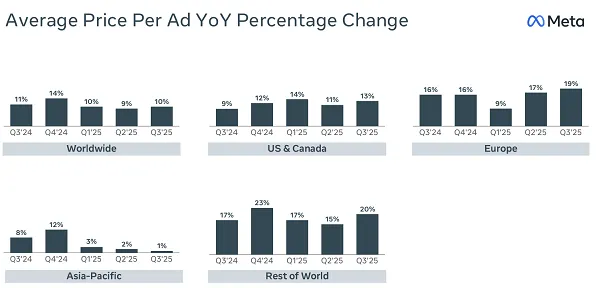Yeah, this appears dangerous.
In response to a new report from Reuters, Meta has estimated that round 10% of its general annual income, equating to round $16 billion, comes from rip-off promoting, and/or promotions for banned items.
The revelation was specified by inside firm paperwork, which Reuters’ journalists have been in a position to entry, presenting the scope of rip-off advert exercise in Meta’s apps, and the profit that the corporate derives from such.
As reported by Reuters:
“On common, one December 2024 doc notes, the corporate reveals its platforms’ customers an estimated 15 billion ‘larger danger’ rip-off commercials – people who present clear indicators of being fraudulent – daily.”
Which can come as little shock to Fb and Instagram customers.
Many individuals have issued many complaints about rip-off adverts and promotions throughout Meta’s apps, which regularly seemingly fall on deaf ears, with no response to consumer studies.
After all, at Meta’s scale, it could actually’t be anticipated to answer each single report that it receives. However the inside paperwork present that Meta will not be solely conscious of the difficulty, however could also be actively ignoring it, as a result of quantity of income these rip-off promotions usher in.
Which, if appropriate, must also irritate all Meta advertisers, primarily based on charts like this:

Meta’s advert prices are rising, which is a mirrored image of demand. Which signifies that on prime of the direct income Meta will get from rip-off adverts, their very presence would additionally driving up prices for all advertisers, which might imply that Meta’s truly gleaning far more general income from this aspect.
Additionally this:
“The paperwork additional notice that customers who click on on rip-off adverts are more likely to see extra of them due to Meta’s ad-personalization system, which tries to ship adverts primarily based on a consumer’s pursuits.”
Yeah, this isn’t a superb report for Meta, with the notes additionally indicating that Meta refuses to behave on probably scams until its system can decide that they’re certainly scams “with 95% accuracy.”
And with an increasing number of individuals falling sufferer to on-line scams, that is already turning into a much bigger focus for enforcement.
In response to the International Anti-Rip-off Alliance, which displays rip-off exercise, victims world wide misplaced at the very least a trillion {dollars} to scams within the final 12 months alone. In response to its “2025 International State of Scams” report, round 23% of adults globally have had cash stolen by scammers, with that determine rising to 41% in South America and Africa.
Given the scope of such, and Meta’s world presence, you may guess that many regulators, in lots of areas, are already in search of extra information on these studies.
Meta, in the meantime, has refuted the claims, noting that these inside paperwork weren’t meant for public consumption, and will not be essentially indicative of the total scope of the difficulty.
Meta has additionally pointed to its evolving rip-off advert detection processes, which have diminished consumer studies of rip-off adverts globally by 58% in 2025.
As such, possibly the scenario isn’t as dangerous because it was. However once more, it’s not a superb search for Meta, and it might find yourself seeing the corporate cop important fines for knowingly permitting such, if the claims are appropriate.
However then once more, if these fines are lower than what it generates from these adverts…
Once more, it appears very probably that regulators shall be poring over these paperwork and claims, and digging into Meta’s advert enterprise, to seek out extra proof that helps this knowledge. And presumably, any effective must exceed what Meta’s gaining from these adverts to make it efficient.
It may very well be one other main blow for the corporate’s repute, and will additionally sluggish its funding in its next-level bets. However then once more, possibly Zuckerberg’s renewed ties with Trump will assist to ease scrutiny, and scale back any associated influence.



